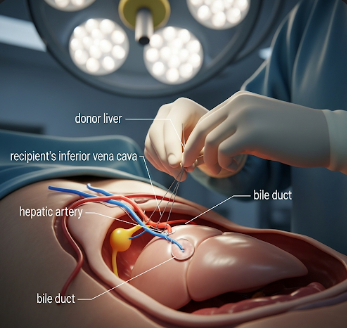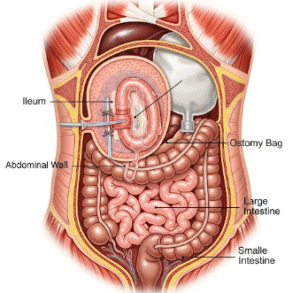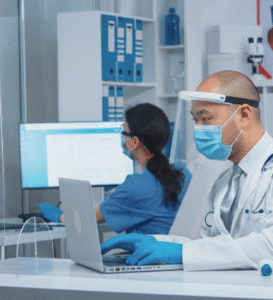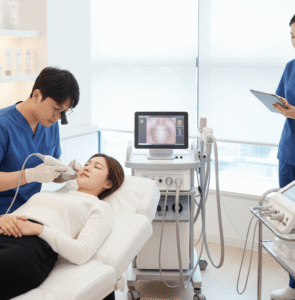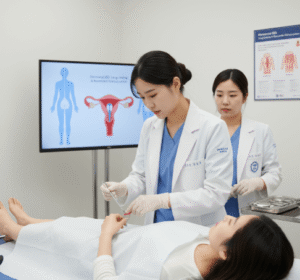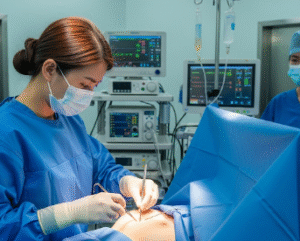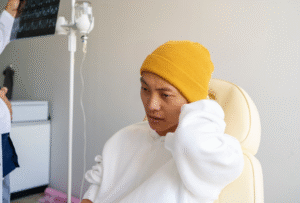Overview
Liver Transplantation is a complex surgical procedure in which a diseased or failing liver is replaced with a healthy donor liver. It is considered a life-saving treatment for patients with end-stage liver disease, acute liver failure, or certain liver cancers.
In Korea, liver transplantation is performed by highly skilled hepatologists and transplant surgeons using advanced surgical techniques, immunosuppressive therapy, and post-operative care, resulting in high survival rates and excellent long-term outcomes.
Highlights:
- ✅ Life-saving procedure for severe liver disease
- ✅ Restores liver function and quality of life
- ✅ Highly advanced transplant care in Korea
What is Liver Transplantation?
Liver Transplantation involves the removal of a damaged or diseased liver and replacement with a healthy donor liver, either from a living donor or deceased donor.
Indications include:
- End-stage liver disease due to hepatitis B or C
- Cirrhosis or liver failure from alcohol or fatty liver disease
- Acute liver failure
- Liver cancers confined to the liver
Important: The success of liver transplantation depends on careful donor-recipient matching, advanced surgical expertise, and diligent post-operative care including immunosuppressive therapy to prevent organ rejection.
What are the benefits?
- Restores liver function: Enables normal metabolism, digestion, and detoxification
- Life-saving: Critical for patients with end-stage liver disease
- Improved quality of life: Relieves symptoms such as jaundice, fatigue, and fluid retention
- Long-term survival: Advances in surgical techniques and immunosuppressive therapy improve outcomes
Key benefits highlighted:
- ⚡ Eliminates or controls liver-related complications
- ⚡ Reduces dependency on medications for liver disease
- ⚡ Enhances overall health, energy, and well-being
- ⚡ Offers long-term survival and potential cure for certain conditions
Procedure Details
1) How should I prepare for Liver Transplantation?
- Preoperative evaluation: Blood tests, imaging, liver function tests, and cardiac evaluation
- Medication adjustments: Review and modify medications as instructed
- Consultations: Multidisciplinary team assessment including hepatology, surgery, and anesthesiology
- Consent and education: Discuss risks, benefits, and post-transplant expectations
- Lifestyle preparation: Maintain proper nutrition, avoid infections, and optimize health before surgery
2) What happens during Liver Transplantation?
- Anesthesia: General anesthesia administered
- Removal of diseased liver: Incision made in the abdomen to access the liver; damaged liver carefully removed
- Implantation of donor liver: Donor liver is positioned and blood vessels and bile ducts are connected
- Verification: Blood flow and bile flow checked to ensure proper function
- Closure: Abdomen is closed with sutures and drains placed as needed
Duration: Typically 6–12 hours depending on complexity and donor type
3) What happens after Liver Transplantation?
- Recovery monitoring: Intensive care monitoring for organ function, bleeding, and vital signs
- Immunosuppressive therapy: Medications administered to prevent organ rejection
- Rehabilitation: Gradual mobilization, diet management, and physical therapy
- Follow-up care: Frequent lab tests and imaging to monitor liver function and detect complications
Highlights for post-operative care:
- ⚡ Monitor for signs of organ rejection or infection
- ⚡ Take immunosuppressive medications exactly as prescribed
- ⚡ Maintain a healthy lifestyle and diet
- ⚡ Attend all scheduled follow-up visits for long-term monitoring
Risks / Benefits
Risks:
- Organ rejection despite immunosuppressive therapy
- Infection due to immunosuppressants
- Bleeding or complications from major surgery
- Bile duct or vascular complications
Benefits:
- Restores liver function and overall health
- Life-saving treatment for end-stage liver disease
- Improves energy, appetite, and quality of life
- Long-term survival with proper post-transplant care
Recovery and Outlook
- Hospital stay: Typically 2–4 weeks depending on recovery and complications
- Full recovery: 3–6 months for most patients to regain strength and normal activity
- Long-term outlook: High survival rates with continued immunosuppressive therapy and follow-up
- Follow-up: Regular monitoring to assess liver function, manage medications, and prevent complications
Tips for optimal recovery:
- ✅ Strict adherence to immunosuppressive regimen
- ✅ Healthy diet and adequate hydration
- ✅ Avoid infections and maintain hygiene
- ✅ Attend all follow-up visits for long-term success
When To Call the Doctor
- Signs of organ rejection (jaundice, dark urine, fatigue)
- Fever, chills, or signs of infection
- Severe abdominal pain or bleeding
- Any unusual symptoms post-transplant
Best Korea Option / Process
Korea provides advanced liver transplantation care:
- Top hospitals: Expert transplant surgeons and hepatology teams
- Advanced diagnostics: Imaging and blood tests for preoperative planning and donor-recipient matching
- Surgical options: Living donor and deceased donor liver transplantation
- Postoperative care: Intensive monitoring, immunosuppressive therapy, and rehabilitation
- International patient support: Online consultation, scheduling, and telemedicine follow-up
Step-by-step process in Korea:
- Online consultation and preoperative evaluation
- Multidisciplinary assessment and preparation
- Liver transplantation surgery performed by expert surgeons
- Intensive post-operative monitoring and early rehabilitation
- Long-term follow-up to ensure liver function and prevent complications

